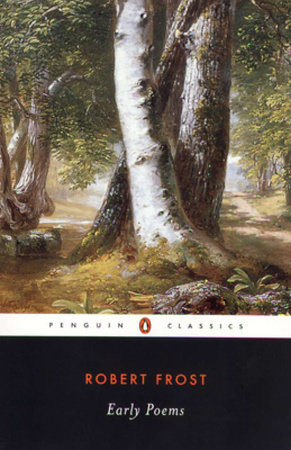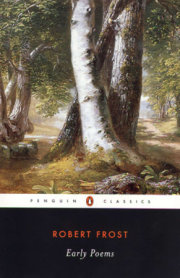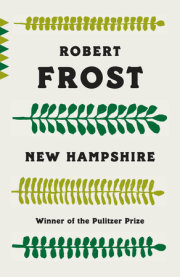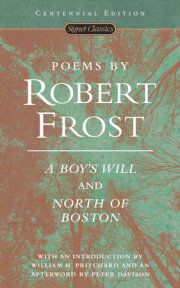Early PoemsIntroduction
Suggestions for Further Reading
A Note on the Texts
A BOY'S WILLInto My Own
The youth is persuaded that he will be rather more than less himself for having forsworn the world.
Ghost House
He is happy in society of his choosing.
My November Guest
He is in love with being misunderstood.
Love and a Question
He is in doubt whether to admit real trouble to a place beside the hearth with love.
A Late Walk
He courts the autumnal mood.
Stars
There is no oversight of human affairs.
Storm Fear
He is afraid of his own isolation.
Wind and Window Flower
Out of the winter things he fashions a story of modern love.
To the Thawing Wind
He calls on change through the violence of the elements.
A Prayer in Spring
He discovers that the greatness of love lies not in forward-looking thoughts;
Flower-Gathering
nor yet in any spur it may be to ambition.
Rose Pogonias
He is no dissenter from the ritualism of nature;
Asking for Roses
nor from the ritualism of youth which is make-believe.
Waiting - Afield at Dusk
He arrives at the turn of the year.
In a Vale
Out of old longings he fashions a story.
A Dream Pang
He is shown by a dream how really well it is with him.
In Neglect
He is scornful of folk his scorn cannot reach.
The Vantage Point
And again scornful, but there is no one hurt.
Mowing
He takes up life simply with the small tasks.
Going for Water
Revelation
He resolves to become intelligible, at least to himself, since there is no help else;
The Trial by Existence
and to know definitely what he thinks about the soul;
In Equal Sacrifice
about love;
The Tuft of Flowers
about fellowship;
Spoils of the Dead
about death;
Pan with Us
about art (his own);
The Demiurge's Laugh
about science.
Now Close the Windows
It is time to make an end of speaking.
A Line-Storm Song
It is the autumnal mood with a difference.
October
He sees days slipping from him that were the best for what they were.
My Butterfly
There are things that can never be the same.
Reluctance
NORTH OF BOSTON
The Pasture
Mending Wall
The Death of the Hired Man
The Mountain
A Hundred Collars
Home Burial
The Black Cottage
Blueberries
A Servant to Servants
After Apple-Picking
The Code
The Generations of Men
The Housekeeper
The Fear
The Self-Seeker
The Wood-Pile
Good Hours
MOUNTAIN INTERVAL
The Road Not Taken
Christmas Trees
An Old Man's Winter Night
A Patch of Old Snow
In the Home Stretch
The Telephone
Meeting and Passing
Hyla Brook
The Oven Bird
Bond and Free
Birches
Pea Brush
Putting in the Seed
A Time to Talk
The Cow in Apple Time
An Encounter
Range-Finding
The Hill Wife:
I. Loneliness - Her Word
II. House Fear
III. The Smile - Her Word
IV. The Oft-Repeated Dream
V. The Impulse
The Bonfire
A Girl's Garden
The Exposed Nest
"Out, Out - "
Brown's Descent or the Willy-Nilly Slide
The Gum-Gatherer
The Line-Gang
The Vanishing Red
Snow
The Sound of the Trees
POEMS TO 1922 (Later published in New Hampshire)
A Star in a Stone-Boat
The Census-Taker
Maple
The Ax-Helve
The Grindstone
Paul's Wife
Wild Grapes
Place for a Third
Two Witches:
The Witch of Coöos
The Pauper Witch of Grafton
Fire and Ice
Dust of Snow
To E. T.
The Aim Was Song
For Once, Then, Something
Blue-Butterfly Day
The Onset
Good-by and Keep Cold
Not to Keep
A Brook in the City
Evening in a Sugar Orchard
The Valley's Singing Day
Misgiving
A Hillside Thaw
Plowmen
On a Tree Fallen Across the Road
The Lockless Door
The Need of Being Versed in Country Things
Explanatory Notes
Index of Titles and First Lines







